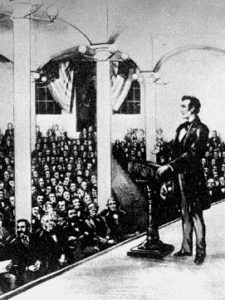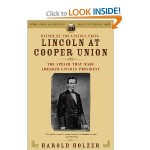 In February 1860, the western-bred Abraham Lincoln must have been astonished by the hustle and bustle around lower New York City. Having crossed the Hudson River from Jersey City to Manhattan, Lincoln made his way to the Astor House, one of most luxurious hotels in New York City, conveniently located near City Hall and Publishers Row (aka, Newspaper Row or Printing House Square) housing the city’s most important newspapers. New York City had grown by over fifty percent just in the last decade, many of whom were immigrants from Ireland, Germany, and other European nations. If Lincoln’s room was on the ground floor of the Astor House, he would have looked out on St. Paul’s Chapel, built in 1766 and where George Washington attended services immediately after taking the oath of office as the first president of the United States. No doubt Lincoln would have looked into the chapel. Today, from a vantage point on Broadway, you can see the new One World Trade Center looming behind the Chapel’s historic spire. From the other side, standing in the burying ground facing the skyscraper, is a “Bell of Hope” rung every year on September 11 to reflect both the mourning of that day and the Chapel’s role as a refuge during that warm, clear cataclysmic day in 2001.
In February 1860, the western-bred Abraham Lincoln must have been astonished by the hustle and bustle around lower New York City. Having crossed the Hudson River from Jersey City to Manhattan, Lincoln made his way to the Astor House, one of most luxurious hotels in New York City, conveniently located near City Hall and Publishers Row (aka, Newspaper Row or Printing House Square) housing the city’s most important newspapers. New York City had grown by over fifty percent just in the last decade, many of whom were immigrants from Ireland, Germany, and other European nations. If Lincoln’s room was on the ground floor of the Astor House, he would have looked out on St. Paul’s Chapel, built in 1766 and where George Washington attended services immediately after taking the oath of office as the first president of the United States. No doubt Lincoln would have looked into the chapel. Today, from a vantage point on Broadway, you can see the new One World Trade Center looming behind the Chapel’s historic spire. From the other side, standing in the burying ground facing the skyscraper, is a “Bell of Hope” rung every year on September 11 to reflect both the mourning of that day and the Chapel’s role as a refuge during that warm, clear cataclysmic day in 2001.
Lincoln’s day was less devastating but also less warm. The weather was frigid and light snow was falling, but the Young Men’s Committee who had taken over sponsorship of his Cooper Union presence took him around Manhattan to see the sights. One stop was Mathew Brady’s photographic emporium, now housed in a temporary studio at 643 Broadway while his new studio was being prepared. Brady was already a celebrity in his own right, and having your photo taken by Brady was quickly becoming a necessity for any up-and-coming politician or social climber. This fit well with Lincoln, who had embraced the new technology of photography within a few years of its invention and had made an effort to have a photograph taken whenever he did anything noteworthy. This certainly fit the requirements and so Lincoln sat for a series of photos, one of the best decisions he would make. Not only would the Cooper Union address itself be widely published in the newspapers, but Brady would also reproduce one of these photos on the new carte-de-visite format, enabling thousands of copies to be made, sold, and broadly circulated. While many historians today refer to Cooper Union as “the speech that made Lincoln president,” the Brady photograph accentuated that by putting a face in front of the public at large. To these two I would add a third component that worked in synergy to make Lincoln president – publication of the Lincoln-Douglas debates in book form. And, of course, there was his post-Cooper Union tour of New England.
Having expected to speech at Beecher’s church to a religiously abolitionist crowd, Lincoln begged away from his tour guides and the many impromptu visitors to lock himself in his hotel room and edit his speech for an audience likely to expect a more erudite speech. Eventually he was escorted by carriage to Cooper Union, which despite the snow was reasonably well attended, about 1,500 people. He was introduced by William Cullen Bryant. Starting slowly, as was his habit, he quickly got into his material and held the audience enrapt for the next one and half hours.
I wrote previously about the gist of the speech, which you can read in this earlier post.
[Photo credit: By Mathew Brady, February 27, 1860 – Public Domain, Wikimedia Commons, ID: cph 3a0910]

Coming in February 2026: Unable to Escape This Toil
Available now – Lincoln: The Fire of Genius: How Abraham Lincoln’s Commitment to Science and Technology Helped Modernize America is available at booksellers nationwide.
Limited signed copies are available via this website. The book also listed on Goodreads, the database where I keep track of my reading. Click on the “Want to Read” button to put it on your reading list. Please leave a review on Goodreads and Amazon if you like the book.
You also follow my author page on Facebook.
David J. Kent is President of the Lincoln Group of DC and the author of Lincoln: The Fire of Genius: How Abraham Lincoln’s Commitment to Science and Technology Helped Modernize America and Lincoln: The Man Who Saved America.
His previous books include Tesla: The Wizard of Electricity and Edison: The Inventor of the Modern World and two specialty e-books: Nikola Tesla: Renewable Energy Ahead of Its Time and Abraham Lincoln and Nikola Tesla: Connected by Fate.



 On this date, November 13, 1859, Abraham Lincoln agreed to give a speech at Cooper Union in lower Manhattan in New York City. History suggests this is the speech that made Lincoln president.
On this date, November 13, 1859, Abraham Lincoln agreed to give a speech at Cooper Union in lower Manhattan in New York City. History suggests this is the speech that made Lincoln president. On February 27, 1860, a tall, lanky lawyer from Illinois gave a speech at a place called Cooper Union in New York City. The speech would make Abraham Lincoln president. Sounds a bit hyperbolic to say such a thing, and there were many other factors that contributed to Lincoln’s success that election season, but the speech did more to make his name in eastern society than any other event.
On February 27, 1860, a tall, lanky lawyer from Illinois gave a speech at a place called Cooper Union in New York City. The speech would make Abraham Lincoln president. Sounds a bit hyperbolic to say such a thing, and there were many other factors that contributed to Lincoln’s success that election season, but the speech did more to make his name in eastern society than any other event. One would think the book’s subtitle “The speech that made Abraham Lincoln President,” would set up an unattainable expectation of greatness. After all, how could a book hold a candle to a great speech? Or perhaps the speech wasn’t so great after all and the author merely wanted to sell more books. And yet, I was wonderfully surprised to see that this really was an exceptional book about an exceptional speech.
One would think the book’s subtitle “The speech that made Abraham Lincoln President,” would set up an unattainable expectation of greatness. After all, how could a book hold a candle to a great speech? Or perhaps the speech wasn’t so great after all and the author merely wanted to sell more books. And yet, I was wonderfully surprised to see that this really was an exceptional book about an exceptional speech.







